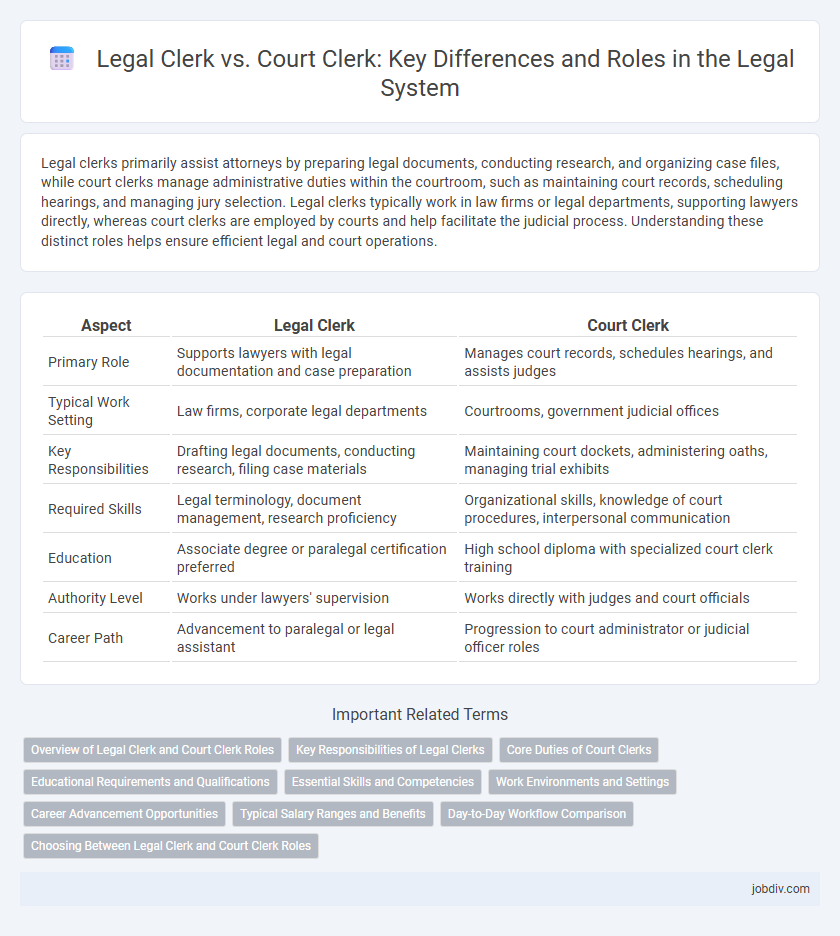Legal clerks primarily assist attorneys by preparing legal documents, conducting research, and organizing case files, while court clerks manage administrative duties within the courtroom, such as maintaining court records, scheduling hearings, and managing jury selection. Legal clerks typically work in law firms or legal departments, supporting lawyers directly, whereas court clerks are employed by courts and help facilitate the judicial process. Understanding these distinct roles helps ensure efficient legal and court operations.
Table of Comparison
| Aspect | Legal Clerk | Court Clerk |
|---|---|---|
| Primary Role | Supports lawyers with legal documentation and case preparation | Manages court records, schedules hearings, and assists judges |
| Typical Work Setting | Law firms, corporate legal departments | Courtrooms, government judicial offices |
| Key Responsibilities | Drafting legal documents, conducting research, filing case materials | Maintaining court dockets, administering oaths, managing trial exhibits |
| Required Skills | Legal terminology, document management, research proficiency | Organizational skills, knowledge of court procedures, interpersonal communication |
| Education | Associate degree or paralegal certification preferred | High school diploma with specialized court clerk training |
| Authority Level | Works under lawyers' supervision | Works directly with judges and court officials |
| Career Path | Advancement to paralegal or legal assistant | Progression to court administrator or judicial officer roles |
Overview of Legal Clerk and Court Clerk Roles
Legal clerks provide essential support by conducting legal research, preparing documents, and assisting attorneys with case management. Court clerks manage courtroom operations, maintain records, and coordinate communication between judges, attorneys, and the public. Both roles require strong organizational skills and knowledge of legal procedures but differ primarily in their specific work environments and responsibilities.
Key Responsibilities of Legal Clerks
Legal clerks primarily support attorneys by conducting extensive legal research, drafting documents, and organizing case files to ensure case accuracy and compliance. They manage client correspondence and assist in preparing trial materials, enabling efficient case preparation. Unlike court clerks who maintain court records and manage courtroom administration, legal clerks focus on assisting legal teams throughout the litigation process.
Core Duties of Court Clerks
Court clerks manage daily courtroom operations, including maintaining accurate records of legal proceedings and filing court documents. They coordinate schedules for judges, juries, and court appearances, ensuring procedural compliance and timely case processing. Their responsibilities also encompass issuing subpoenas, administering oaths, and managing evidence exhibits during trials.
Educational Requirements and Qualifications
Legal clerks typically require an associate degree in paralegal studies or legal assisting, with strong knowledge of legal terminology and procedures. Court clerks often need a high school diploma or equivalent, though some positions may prefer an associate degree or on-the-job training in court administration. Both roles benefit from skills in organization, attention to detail, and familiarity with legal documentation, but legal clerks usually require more specialized education related to legal research.
Essential Skills and Competencies
Legal clerks excel in document management, legal research, and drafting, requiring strong analytical skills, attention to detail, and proficiency in legal terminology. Court clerks demonstrate expertise in courtroom procedures, case scheduling, and records maintenance, necessitating organizational abilities, communication skills, and knowledge of judicial protocols. Both roles demand confidentiality, time management, and familiarity with legal software to ensure efficient courtroom and law office operations.
Work Environments and Settings
Legal clerks predominantly work in law firms, corporate legal departments, or government agencies, where they assist attorneys by organizing case files, conducting legal research, and drafting documents. Court clerks operate primarily in courthouse settings, managing court records, scheduling hearings, and facilitating communication between judges, attorneys, and the public. Both roles require familiarity with legal procedures, but legal clerks are more office-bound while court clerks often engage directly with courtroom activities and judicial staff.
Career Advancement Opportunities
Legal clerks gain valuable experience in legal research and case preparation, which can lead to advancement as paralegals or legal assistants within law firms. Court clerks acquire specialized knowledge of courtroom procedures and judicial administration, positioning them for promotion to senior court clerk roles or administrative officer positions within the court system. Both career paths offer growth through certification programs and on-the-job training, enhancing opportunities for higher-level legal or judicial administrative roles.
Typical Salary Ranges and Benefits
Legal clerks typically earn between $35,000 and $50,000 annually, with benefits often including health insurance, retirement plans, and paid leave, reflecting their support role in law firms and legal departments. Court clerks generally have a higher salary range, from $40,000 to $60,000 per year, due to their responsibilities in managing court records and assisting judges, with benefits frequently covering comprehensive healthcare, pension plans, and professional development opportunities. Salary variations depend on geographic location, experience, and the specific legal or judicial institution involved.
Day-to-Day Workflow Comparison
Legal clerks primarily manage case files, draft legal documents, and assist attorneys with research, ensuring all paperwork is accurate and organized for trial preparation. Court clerks handle administrative duties within the courtroom, such as maintaining official records, swearing in witnesses, and coordinating case schedules to ensure smooth court proceedings. Both roles require meticulous attention to detail but differ in their operational focus--legal clerks work behind the scenes in law offices, while court clerks operate within the judicial system's administrative framework.
Choosing Between Legal Clerk and Court Clerk Roles
Choosing between legal clerk and court clerk roles depends on the preferred work environment and responsibilities; legal clerks primarily assist attorneys by conducting legal research and drafting documents, while court clerks manage courtroom procedures and maintain official records. Legal clerks typically work in law firms or corporate legal departments, requiring strong analytical skills and familiarity with legal terminology. Court clerks operate within the judicial system, necessitating knowledge of court protocols and excellent organizational abilities to support judges and court personnel.
Legal Clerk vs Court Clerk Infographic

 jobdiv.com
jobdiv.com